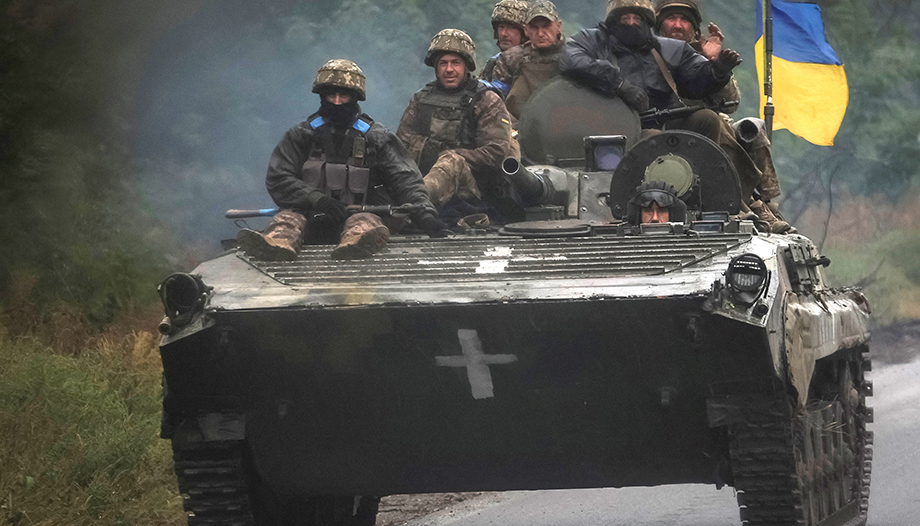Testo del articolo in inglese qui
In a few days seven months of the senseless conflict in Ukraine, which is causing destruction and death, as well as putting the whole world under siege due to the economic and social consequences of the war, will be completed. Not that there are no wars in other parts of the world - as Pope Francis has repeatedly made clear - but we see this conflict as more pressing both because it is taking place at our doorsteps and because it is affecting the material daily life of our existence.
Since the beginning of the war waged by Russia, Pope Francis has called for an end to the hostilities more than 80 times, and has described the clashes as senseless monstrosities, insanity... folly. He has insistently called for the path of dialogue without other pretensions, and for Christians to implore God's gift of peace through constant prayer.
Dialogue
In his press conference with journalists returning from Kazakhstan, he stated that, even at the cost, it is necessary to "talk" with the enemy, because the priority is the human lives to be saved and the end of the conflicts. Then it will be time to put in place the things according to justice, assessing the responsibilities of each one, but the urgency is to strike as soon as possible.
According to the latest news coming from the war zones, it seems that Ukraine is recapturing part of the territories previously held by the Russian army. If on the one hand this scenario may represent an element of optimism towards the conclusion of the conflict with the complete withdrawal of the occupants, it is not excluded that on the other hand an even more violent offensive is being (re)prepared. We hope not.
Costruttori di pace
In this frangente, an explicit proposal is emerging from the Catholic side to arrive as soon as possible to the definitive peace at least in this area east of Europe. It bears the signature of none other than the President of the Pontifical Academy of Sciences, the Italian Stefano Zamagni, who in this case is the spokesman of the vast magisterium on the call to be "builders of peace". A noted economist and academic, he was also one of the main collaborators of Pope Benedict XVI for the establishment of the Encyclical. Caritas in veritate.
Zamagni, in Italy, is also the inspirer and founder of a "Christianly inspired" political group, centrist and popular, called "Insieme", which puts work, family, solidarity and peace at the top of its program. Therefore, in this book, he has written a long contribution that retraces the steps that have led to the conflict, but at the same time, he makes some strong points "for a credible negotiation of peace".
It is about seven points on which the judge has reason to believe that they can be "favorably accepted by the parties in conflict" if the proposal is "appropriately presented and wisely managed through diplomatic channels". Overall, says Zamagni, "peace is not an irrational objective because war is not something that strikes like an earthquake or a tsunami; but it is the result of the choice of people who want it. And so is peace.
The 7 points of the proposal
Ecco i sette punti della proposta di pace firmata dal Presidente della Pontificia Accademia delle Scienze:
PrimoThe "Neutrality of Ukraine, which renounces the national ambition to join NATO, but retains the full freedom to become part of the EU, with all that this means".
SecondoThe Ukraine has the guarantee of its own sovereignty, independence and territorial integrity; a guarantee assured by the 5 permanent members of the United Nations (China, France, Russia, UK, USA) as well as by the EU and Turkey.
TerzoRussia retains de facto control of the Crimea for a number of years yet, given that the parties close, through diplomatic channels, a permanent de jure system. The local communities enjoy facilitated access both to Ukraine and to Russia; in addition to the freedom of movement of persons and financial resources".
QuartoAutonomy of the regions of Lugansk and Donetsk within Ukraine, of which they remain an integral part, under economic, political and cultural aspects".
FifthThe company's main objective is to guarantee access to Russia and Ukraine to the ports of the Black Sea, for the development of normal commercial activities.
SestoThe gradual removal of Western sanctions against Russia in parallel with the withdrawal of Russian troops and weapons from Ukraine".
SettimoCreation of a Multilateral Fund for the Reconstruction and Development of the disputed and seriously neglected areas of Ukraine, a fund to which Russia is asked to contribute on the basis of predefined proportionality criteria".











